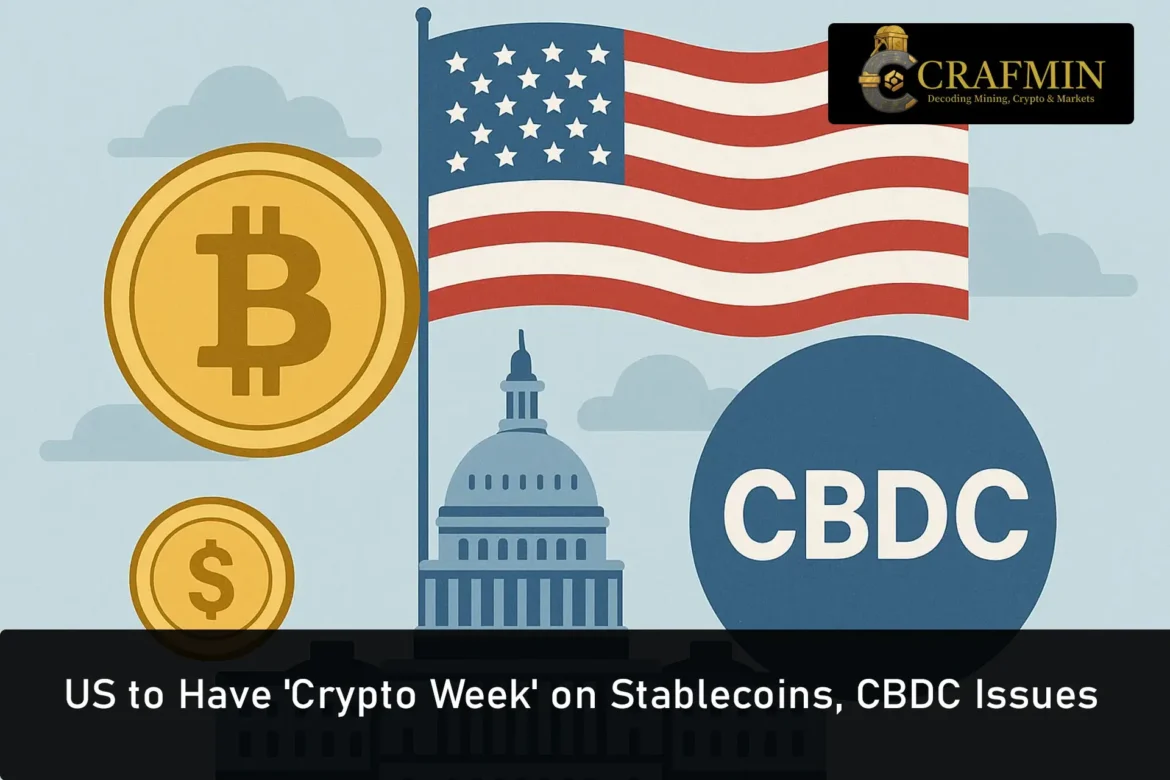The U.S. House of Representatives will take the plunge headfirst into so-called “Crypto Week” next week, a go-or-no-go week of legislative votes that will redraw America’s digital asset regulatory future. From regulation of stablecoins, regulation of the crypto universe, and a draft ban on CBDCs, mainstream finance and the cryptoverse is collectively holding its breath.
US politics is heating up when it comes to cryptocurrency overhaul. House Republicans are paving the way for votes next week on three pioneering bills:
- The Genius Act (specifically tackling stablecoins)
- The Clarity for Digital Tokens Act (ending regulatory uncertainty)
- The Anti-CBDC Surveillance State Act (protest against a government-issued digital dollar)
The bills will give the world of crypto clarity with better regulations and safeguard consumers’ privacy and market stability.
“The House is moving swiftly to place the US at the leader in responsible digital finance,” House Speaker Mike Johnson said, supporting the package as part of an effort to “rebuild transparency and choice in financial markets.”
The House is taking historic steps to ensure the U.S. remains the crypto capital of the world.
As part of “Crypto Week,” the House will consider:
➡️the CLARITY Act
➡️the Anti-CBDC Surveillance State Act
➡️the GENIUS Act https://t.co/pIi1Xrce0S— Financial Services GOP (@FinancialCmte) July 8, 2025
What’s at Stake?
If passed, these bills would transform the role of cryptocurrencies and blockchain-based systems in the financial system. The bills focus on:
- How stablecoins are backed, issued, and regulated
- Which regulators would regulate different classes of digital assets
- Whether to have a federal currency or not
All of which have produced decades of contention among regulators, startups, investors, and consumer groups.
Industry participants believe the added clarity will allow innovation to flourish. Critics fear the bills will place industry agendas in front of protections justified.
Breaking Down the Bills
The Genius Act would require issuers of stablecoins to hold reserve levels, register with financial regulators and be able to submit to regular audits as well. It has been approved by the Senate on a bipartisan vote and is awaiting a vote in front of the House.
The Clarity Act simplifies digital assets by delegating jurisdiction of digital commodities to the Commodity Futures Trading Commission (CFTC) and jurisdiction over digital assets qualifying as securities to the Securities and Exchange Commission (SEC). The jurisdictions’ decades-long fight has confused business and delayed projects.
The Anti-CBDC Bill would bar the Federal Reserve from producing a central bank digital currency. The authors feel that a government-backed digital dollar would be an intrusion into the world of financial privacy since it would be giving the federal government too much data about consumer spending by its citizens.
Industry and Academic Response
The bills were cold-shouldered.
Blockchain Association Summer Mersinger appreciated the bills, further stating that it is “a long-overdue effort to bring order to a disordered regulatory landscape.”
Academic scholars like Professor Murat Kantarcioglu acknowledge stablecoins need regulating but warn that the devil is in the detail. “If we’re introducing transparency without true accountability, then we could potentially be trading one imperfect system for another,” he said.
Consumer constituencies are doubting. Corey Frayer of the Consumer Federation of America replied, “This is a crypto company wish list. We can’t forget the consumer risks in the name of growth.”
Also Read: Stripe’s Blockchain Move: A Payments Game Changer Globally?
Possible Impacts
If the bill had cleared the House and reached the White House, anticipate a domino effect across a wide range of sectors:
- Stablecoin issuers would be more heavily regulated, with further disclosure about their reserves and regulator oversight.
- Crypto exchanges are now able to indulge in open lines of licensing on the nature of tokens they’re handling.
- Firms and banks can now approach with openness, informed by the laws.
- People can now indulge in enhanced protection and less rug-pull scams.
But if the Anti-CBDC Act is enacted, then the US would officially deviate from progressing toward a digital dollar, being an outlier to China and other nations already piloting centralised digital currency.
Global Impact
America is already behind the EU and a section of Asia when it comes to seriously enforcing crypto law. The votes this week can serve as a wake-up call for the rest of the world that America finally caught up.
And if that bill is enacted, international companies operating in or with the US will have to get with the program. Or, if reform legislation can encourage innovators to shop around for freer regimes, it will continue to de-centralize global crypto leadership. Looking Ahead
The House will move this month or at least in July. If approved, the bills will sit on the President’s desk, hopefully to be signed, given the bipartisan backing of the Genius and Clarity Acts.
Cryptocurrency exchanges, banks, and fintech firms, in the meanwhile, are working through their policies and infrastructure, seeking compliance measures that can go live as early as 2026.
Employers also may be compelled to go through in-house practices so that digital property is treated as required by the new rules.
Bottom Line
“Crypto Week” next week isn’t drama. It’s an American milestone for crypto regulation, privacy, and market stability.
For industry participants, it’s a moment of preparation, accommodation, and engagement.
For investors and users, it’s the promise of a more secure, better-regulated crypto experience.
It’s time policymakers caught up with responsibility.
As the world holds its breath, Washington can lead, the way this time is for a reason.

